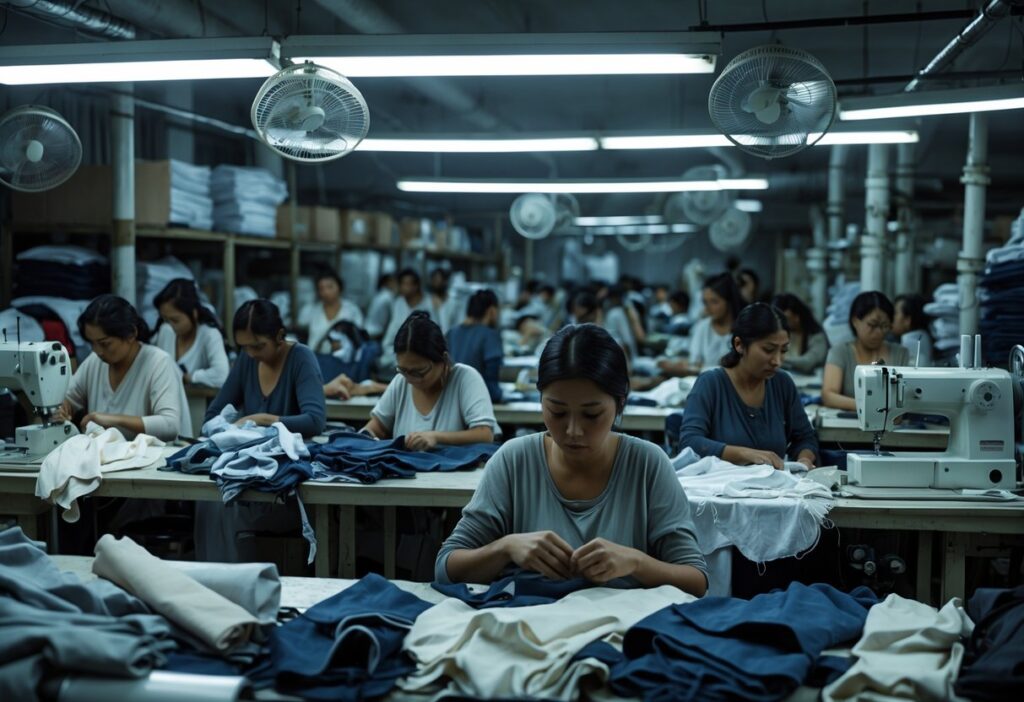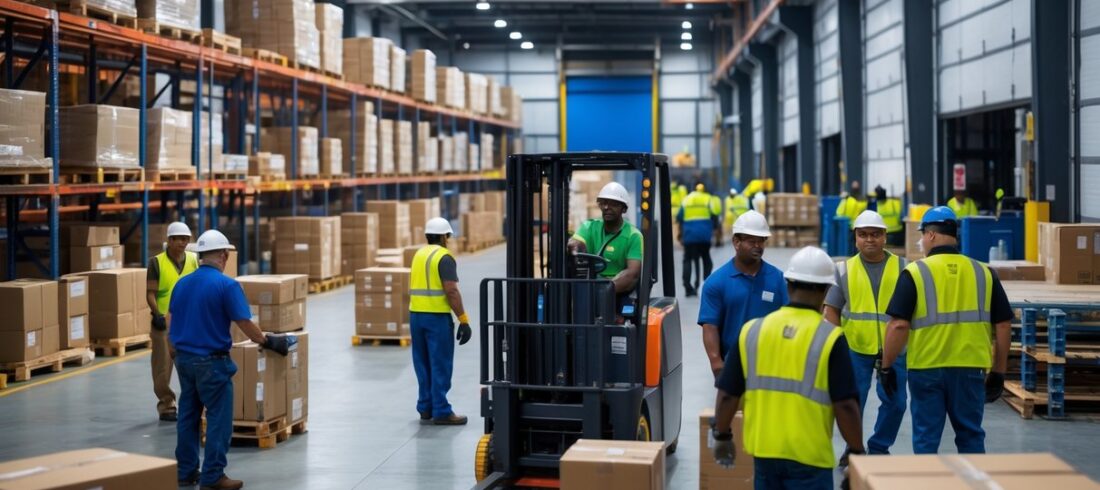You might be surprised to learn that sweatshop conditions still exist today in Los Angeles’s busy Fashion District. Workers, many of them immigrants, earn shockingly low wages—sometimes as little as $3 an hour—while working long days with little protection or rights. Garment workers in LA often face unsafe conditions, unfair pay, and harsh treatment despite the popularity of the clothes they help create.

When you walk into a trendy store or shop online from big brands, you probably don’t think about who made your clothes or what they went through. But behind the scenes, the reality can be harsh. Knowing what really goes on in these factories might change how you see the fashion industry.
Unveiling Sweatshop Conditions in LA’s Fashion District
Los Angeles is known for its booming fashion industry, but what goes on behind closed factory doors isn’t as glamorous as it seems. Many workers face harsh conditions just to keep up with the demand for trendy clothes.
Overview of LA’s Fashion Industry
Los Angeles has one of the largest fashion and textile production regions in the United States. The Garment District is packed with over 1,200 brands, many of which rely on fast, local manufacturing to quickly fill store shelves.
You’ll find famous names and up-and-coming labels making their clothes here. Stores like Fashion Nova use these local factories to produce trendy pieces at lightning speed.
Jobs in this sector attract thousands, especially immigrants searching for work. Even with such high output, few outsiders realize just how rough the job can be for the people making these clothes.
Hidden Realities Behind the Glamour
Many factories in LA’s Fashion District make use of cheap labor, much of it undocumented and unprotected by unions. Workers are often women from Mexico, Central America, and Asia who live paycheck to paycheck.
Some are paid as little as $4.66 an hour, well below California’s minimum wage. Employers sometimes demand seven-day workweeks and ignore workplace safety.
These sweatshops can have unsafe machinery, poor ventilation, and locked exits—a far cry from the images shown in brand ads. Reports of intimidation and threats against organizing or speaking up are common.
If you face these conditions, an employment lawyer who specializes in Los Angeles labor laws can help you learn about your rights and possible actions.
Major Players and Fashion District Affected Workers
Big brands often subcontract work to smaller factories, which helps keep costs low but also hides who is responsible. Fashion Nova is just one major company linked to sweatshop conditions, but many other recognizable names rely on the same system.
The people most affected are the workers—mainly immigrant women—doing long hours in harsh conditions for little pay. These workers rarely have job security or benefits.
Here’s a snapshot:
| Key Group | Situation |
|---|---|
| Immigrant workers | Unsafe work, low pay |
| Factory owners | Pressure to cut labor costs |
| Fashion brands | Outsource to save money |
Your legal rights matter. If you or someone you know is dealing with these conditions, reaching out to a Los Angeles employment lawyer might be the first step to better treatment.
Labor Violations and Fashion District Worker Rights Issues
In LA’s Fashion District, sweatshops are a hidden but real problem. Many workers struggle with low pay, unsafe conditions, and a lack of rights protection.
Common Fashion District Sweatshop Labor Violations
A large number of garment factories in Los Angeles break several labor laws. Reports show that up to 85% of L.A. garment shops inspected had pay violations. You might find workers being paid far below minimum wage or not getting overtime pay.
Some shops also ignore rules for breaks and maximum working hours. Employers sometimes pay workers by the piece, which means the faster you work, the more you earn—but often, it’s not enough to reach even the legal minimum. This system can make you feel forced to skip breaks just to earn a basic wage.
To make matters worse, wage theft is a major issue. According to a UCLA Labor Center report, low-wage workers in L.A. lose about $26.2 million every week to wage theft. If you ever face similar issues, Employment Lawyer Los Angeles and other legal groups are available to help you understand your rights.
Stories From The Fashion District Assembly Line
Life inside these factories can be rough. Workers share stories about facing threats if they try to speak up or demand fair treatment. Many are afraid to contact a Los Angeles Employment Lawyer because of fear of losing their jobs or facing retaliation.
Some workers have described working over 12 hours a day without proper breaks. One person shared how a manager refused to let her use the bathroom during a long shift. Others say they have been yelled at or pressured to finish rush orders, even if they’re already exhausted.
Language barriers also make it tough to ask for help. Some workers, especially immigrants, feel alone and don’t know where to turn. Having a support system or legal advocate, like an employment attorney, can make a big difference in these situations.
Fashion District Health and Safety Concerns
Health and safety in LA sweatshops is a big worry. Many factories have poor ventilation, extreme heat, and crowded work areas. You might find old, broken-down equipment and blocked emergency exits, increasing the risk of injury.
Workers have reported breathing in fabric dust all day, causing coughs or even asthma. It is common for these buildings to lack air conditioning, so inside temperatures can get unbearable during summer. Some also share concerns about slippery floors and heavy lifting.
When accidents happen, there’s often no real help or first aid. If you’re hurt on the job, getting medical care or reporting unsafe conditions can be hard. Knowing your rights and connecting with support from groups like Los Angeles Employment Lawyer can help you demand safer workplaces.
Legal Framework and Advocacy in Los Angeles
The fight against sweatshop conditions in LA’s Fashion District ties closely to local labor laws and strong advocacy from legal experts. Workers face unique challenges, but you have important rights and resources if you work in this industry.
Relevant Labor Laws and Regulations
Los Angeles has local, state, and federal laws meant to protect garment workers. The Fair Labor Standards Act (FLSA) sets minimum wage, overtime, and basic workplace protections. In California, state laws go further by mandating meal and rest breaks, as well as higher minimum wages.
Local bills, like the California Garment Worker Protection Act, target wage theft. This law holds fashion brands responsible for contract workers’ pay. The U.S. Department of Labor has investigated wage and safety violations in dozens of factories, while California law lets workers report problems anonymously.
If you’re underpaid or facing unsafe conditions, the law gives you options to file complaints and claim owed wages. Penalties for violating labor laws can be severe, including fines or shutting down unsafe factories.
Role of Employment Lawyers
Employment lawyers in Los Angeles play a big part in fighting for garment workers’ rights. If you have problems getting paid, facing discrimination, or suffering unsafe conditions, a Los Angeles Employment Lawyer can guide you through the legal process.
These lawyers can help you recover unpaid wages, file safety complaints, and challenge unfair treatment at work. They often represent workers in negotiations or in court if needed. Many employment lawyers take on cases where workers don’t have to pay unless they win.
Some legal groups and non-profits offer free or low-cost help for garment workers. You can search for a trusted Employment Lawyer Los Angeles online or contact local worker centers for advice.
Fashion District Worker Rights Education
Learning your rights is one of the strongest tools you have as a garment worker. Many local organizations and advocacy groups, like the Garment Worker Center, regularly hold workshops and trainings about labor laws.
They teach you how to document problems, contact state agencies, and organize with others facing similar abuse. Sometimes, workers are not aware of laws that protect them or how to safely report abuses. Educational flyers, hotlines, and community meetings help spread the word in different languages.
It’s common to see worker-led campaigns in LA’s fashion district. Knowing your rights lets you stand up to wage theft, unsafe conditions, and threats from employers. If you’re unsure where to start, these community resources can give you the support and information you need.
Industry Response and Social Impact
You might expect fashion brands and local groups to react when harsh sweatshop conditions come to light. Some companies focus on their own supply chain, while others turn to community groups that push for workers’ rights right in Los Angeles.
Brands’ Accountability Efforts
Big fashion brands have started to face more pressure to keep workers safe and treat them fairly. New laws, like a recent California bill, make brands share responsibility if garment workers are underpaid or work in unsafe factories.
Some companies are now doing more frequent factory inspections and promising to pay fair wages. However, many workers still do not see much change in their pay or work conditions. Some brands even threaten to move jobs to other countries if they do not get cheaper labor.
Here’s how some brands are responding:
| Brand Response | What It Means |
|---|---|
| Increased audits | More checks, but sometimes not enough |
| Wages agreements | Promises to pay more, vary by factory |
| Relocating production | Jobs could leave LA for cheaper places |
Fashion District Community Activism and Support Networks
Community groups in LA play a big role in helping garment workers. The Garment Worker Center and similar organizations help workers speak up, understand their rights, and connect with legal support. Many of these groups focus on immigrants, especially women working in sweatshops.
Activists lead protests, help file legal complaints, and push for enforcement of wage laws. You can often find community meetings and workshops where workers learn about safe conditions and how to get unpaid wages.
With few union protections, support networks often act as a safety net. They help workers handle threats from employers and provide a place to share real stories about the challenges of sweatshop labor.
Breaking the Cycle: What Can Be Done?
Stopping sweatshop conditions in LA’s fashion district takes real changes on several levels. Workers need ways to protect themselves, and your decisions as a shopper matter too.
Empowering Workers in LA
Many garment workers in LA are paid far below the minimum wage. Some make as little as $6 an hour. Most are immigrants, and many feel pressured to keep quiet about bad conditions. To change this, workers need to know their rights and have support if they speak up.
Groups like the Garment Worker Center help workers with training, organizing, and legal support. These organizations help workers stand up for fair pay and safe workplaces. When workers share their experiences and organize together, it’s harder for factory owners to ignore labor laws.
Reporting abuse can feel risky, so protection from retaliation is important. Laws exist, but enforcement needs to get stronger. Supporting local worker groups helps make sure workers have a real voice.
Consumer Choices and Social Awareness
Your shopping choices can help pressure brands to improve factory conditions. Some clothing lines use “Made in USA” to sound ethical, but many LA factories still break labor laws. Before you buy, look for brands with strong labor standards and transparent supply chains.
Ways you can help:
- Check for certifications like Fair Trade or union-made.
- Follow campaigns that spotlight sweatshops and support their actions.
- Share information on social media so others learn about these issues.
The more people know, the harder it becomes for sweatshops to operate in secret. Brands pay attention when you and others demand better. Simply questioning where your clothes come from makes a big difference.
5th Floor
Pasadena, California 91106






